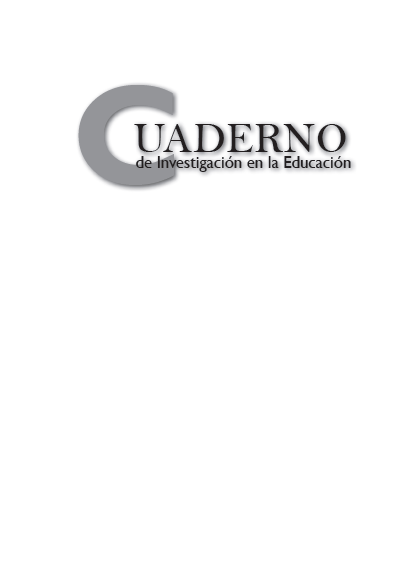Abstract
This article discusses how children´s literature mediates between students‘ personal experiences and the text, producing various written discourses. Two strategies that helped contextualize meaning are described from a sociocultural view of reading: the literary conversation and the literary journal. Three vignettes illustrate how oral and written texts show the transaction between child and author. In these vignettes situated meanings were developed through three thematic axes: identity, justice and affection. Finally, the paper shows how teacher researchers reflect about the relationship between theory and practice.
How to cite:
Cuevas-De Jesús, E. (2013). "Todos podemos ser lo que queramos": El discurso escrito como vivencia en el aula. Cuaderno de Investigación en la Educación, 28, 61-73. Retrieved from https://revistas.upr.edu/index.php/educacion/article/view/13572
References
Browne, A. (2009). Willy, el soñador. México: Fondo de Cultura Económica.
Cannon, J. (1997). Verdi. San Diego, CA: Harcourt Brace.
Cuevas de Jesús, E. (2000). Yo puedo escribil lo que yo quiera: la escritura en el diario de tres niños de kindergarten. (Tesis inédita). Universidad de Puerto Rico, Recinto de Río Piedras.
Cuevas de Jesús, E. (2010). Autores emergentes: niños creadores de textos en un salón multigrado. Cuadernos de Investigación en la Educación, 25. Recuperado de http://cie.uprrp.edu/cuaderno/ediciones/25/09.html
Dyson, A.H. (1988). Drawing, talking and writing: Rethinking writing development (Occasional Paper no. 3). Berkeley, CA: National Center for the Study of Writing, University of California.
Dyson, A.H. (1993). Social worlds of children learning to write in an urban primary school. New York, NY: Teachers College Press.
Gee, J.P. (2000). Discourse and sociocultural studies in reading. Reading Online, 4(3). Recuperado de: http://www.readingonline.org/articles/art_index.asp?HREF=/articles/handbook/gee/index.html
Gillen, J. (2003). The language of children. New York, NY: Routledge.
Halliday, M. (1975). Learning how to mean: Explorations in the development of language. Londres: Edward Arnolds.
Harste, J., Short, K. & Burke, C. (1988). Creating classrooms for authors. Portsmouth, NH: Heinemann.
Hoffman, M. (1996). La asombrosa Graciela. New York, NY: Dial Books for Young Readers.
Kantor, R., Miller, S. & Fernie, D. (1992). Diverse paths to literacy in preschool classroom: A sociocultural perspective. Reading Research Quarterly, 27(3), 185-201.
McKay, S.L. (1996). Literacy and literacies. En S. Mckay & N. Hornberger (Eds.), Sociolinguistics and language teaching. New York: Cambridge University Press.
Molina Iturrondo, A. (1999) Leer y escribir con Adriana. San Juan: Editorial de la Universidad de Puerto Rico.
Moll, L. C. (Ed.). (1990). Vygotsky and Education: Instructional implications and applications of sociohistorical psychology. New York, NY: Cambridge University Press.
Peterson, R y M. Eeds. (2007). Grand Conversations: literature groups in action. New York: Scholastic.
Rosenblatt, L. M. (1978). The reader, the text, the poem: the transactional theory of literacy work. Carbondale, Il: Southern Illinois University Press.
Sáez Vega, R. (1999). "Yo me meto en el cuento y ayudo". La creación de mundos a través de la lectura. En R. J. Sáez Vega, C. M. Cintrón de Esteves, D. T. Rivera Viera, C. Guerra Lozano & M. I. Ojeda O‘Neill, Al son de los tiempos: procesos y prácticas de la lectoescritura. Santo Domingo, RD: Editorial Centenario.
Short, K. & Kauffman, G. (2005). Examining prejudice through children‘s responses to literature and the arts. Democracy and Education, 15(3/4), 49-56.
Short, K. & Pierce, K. (1990). Talking about books: Creating literate communities. Portsmouth, NH: Heinemann.
Vygotsky, L. S. (1978). Mind in Society. Cambridge, MA: MIT Press.

This work is licensed under a Creative Commons Attribution-NonCommercial 4.0 International License.
Copyright (c) 2013 Cuaderno de Investigación en la Educación

